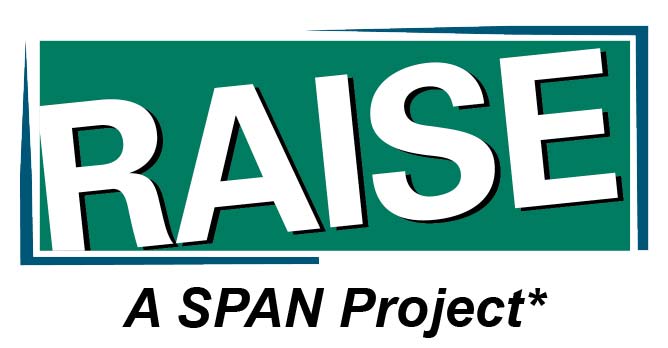Resources
Search our Transition Database, find resources by topic, read our newsletters and more.RAISE partners with the Center for Parent Center Information and Resources (CPIR) to provide information on a variety of Transition-related topics. Parent Centers, families, and youth can search the Resource Database, courtesy of the CPIR.
Search
Here are some suggested search keywords: Transition, Employment, Graduation, Healthcare, Health and Wellness, Education, Training, Youth Development, College, Postsecondary, Self Determination, Independent Living, Law, Policy(ies), Rights, Regulations, or other keywords. The tabs that show up in the results will filter the search even more.
Resources for Partners, Parent Centers & Families
Find Resources by Topic or FormatResources by Topic
Resources by Format
Transition Alphabet Soup! What do these acronyms mean?
ABLE Account
Savings accounts for people with disabilities which allow them to keep benefits.
ACL Administration on Community Living
Maximizes independence for people with disabilities and older adults.
ADA Americans with Disabilities Act
The civil-rights law that supports people with disabilities to be treated with fairness.
ADL Activities of Daily Living
Everyday tasks people do to live and home and remain independent.
Career / Vocational Assessment
Tests that measure work-related skills and interests.
CBI: Community Based Instruction
Teaching skills, such as employment skills, in natural environments.
CIL Centers for Independent Living
Support community living and independent for people with disabilities.
Competitive Employment
A job which is paid at the same rate as wages paid to people without disabilities doing similar work.
Councils on Developmental Disabilities
Identify the needs of people with developmental disabilities in their state and work towards systems change to enhance independence.
Disability-Rights
Called Protection and Advocacy in some states, they promote the rights of people with disabilities.
DDS-Division/Department of Disability Services
Provides information/referral to services for individuals with disabilities.
DHS-Department of Human Services
Protects health and wellbeing by providing essential human services, especially for vulnerable populations.
Dual Diagnosis
Refers to someone with co-occurring conditions such and developmental disability and mental illness, or mental illness and substance use.
DVR-Division of Vocational and Rehabilitative Services
Helps people with disabilities prepare for or maintain employment.
Group Home
Where people who are unrelated and need care live together, however this is not truly community based as people are grouped based on their condition.
Guardianship
A legal process in which someone else makes decisions for an adult; although this used to be widely accepted, it takes away the civil-rights of the individual and supported decision-making is preferred.
Home Care
Care required in the home to maintain someone in their community, rather than institutional care.
HIPAA-Health Insurance Portability and Accountability Act
Protects private health information.
IDEA: Individuals with Disabilities Education Act 2004
Federal special education statute.
IEP: Individualized Education Program
The student’s educational plan which includes supports and services.
IEP Team
The team which includes parents and child study that develops the IEP.
Independent Living
Living like nondisabled peers with the ability to make decisions and choose activities.
IPE Individualized Plan for Employment
The job-related plan for employment and services need to reach employment goals.
Job Coach
Assists individuals with disabilities to learn or keep a job.
Job Training
Prepares people with disabilities for employment.
Medicaid
Public health coverage for low income or people with disabilities.
Medicare
Public health coverage for people with disabilities or those over 65.
PASS Plan for Achieving Self-Support
A savings plan for people with disabilities to reach a work goal.
Pre-Vocational
Pre-employment skills training to help people with disabilities get a job.
Pre-ETS Pre-Employment Transition Services
Provided to prepare students with disabilities for competitive employment.
Rehabilitation Act of 1973
Supports disability fairness and provides services such as training for independent living.
Self-Advocacy
Being able to communicate needs and access-services.
Self-Determination
Making decisions, setting goals, and self-advocacy.
Sheltered Workshop
Employs people with disabilities separately from others and pays below minimum wage.
SGA Substantial Gainful Activity
The level of work of non-disabled peers.
SNT Special/Supplemental Needs Trust
A savings plan that allows people with disabilities to maintain benefits.
Social Security
Assists retirees, survivors, and people with disabilities.
SSDI Social Security Disability Income (SSDI)
Disability benefits based on a work history.
SSI Supplemental Security Income (SSI)
Cash assistance for people with disabilities who are not gainfully employed.
Supported Employment
Helps people with disabilities with supports to obtain inclusive-competitive employment.
Transition
Moving from school to adult life which includes health care, work, and independent living.
Transition Services
Plans what a student with disabilities wants to do post-school.
Work Incentives
Working while receiving disability benefits.
